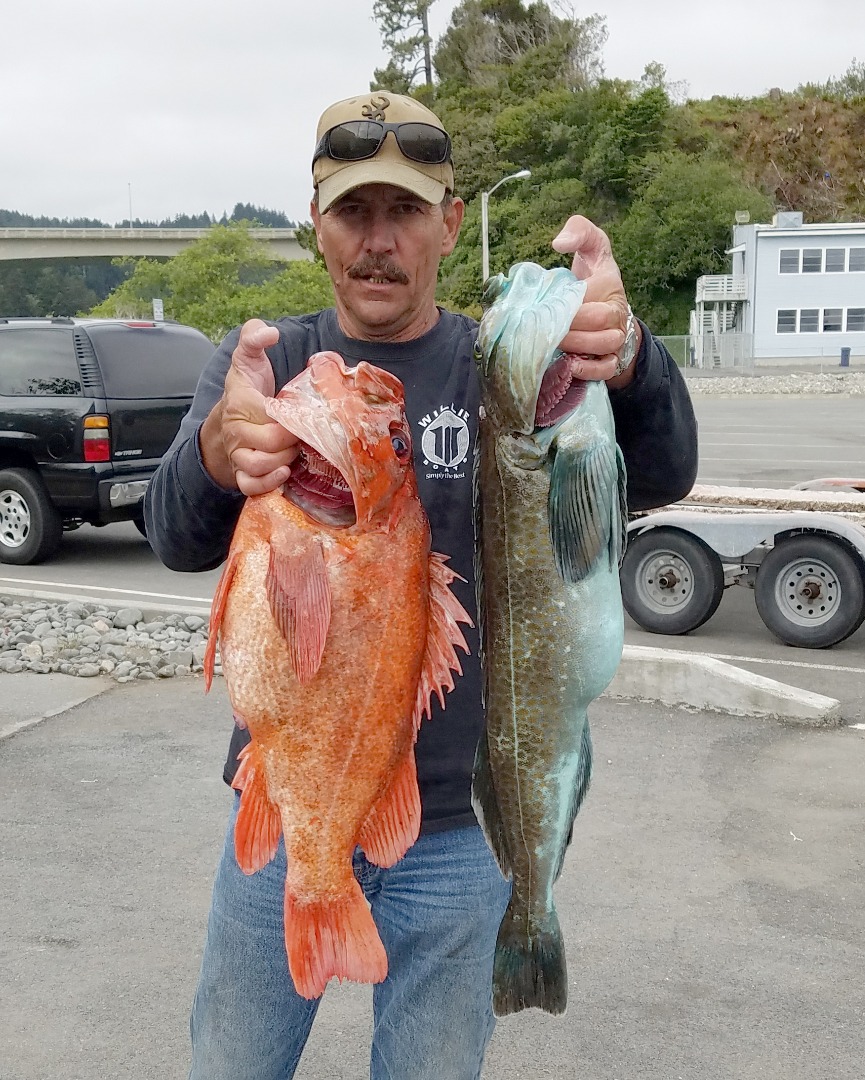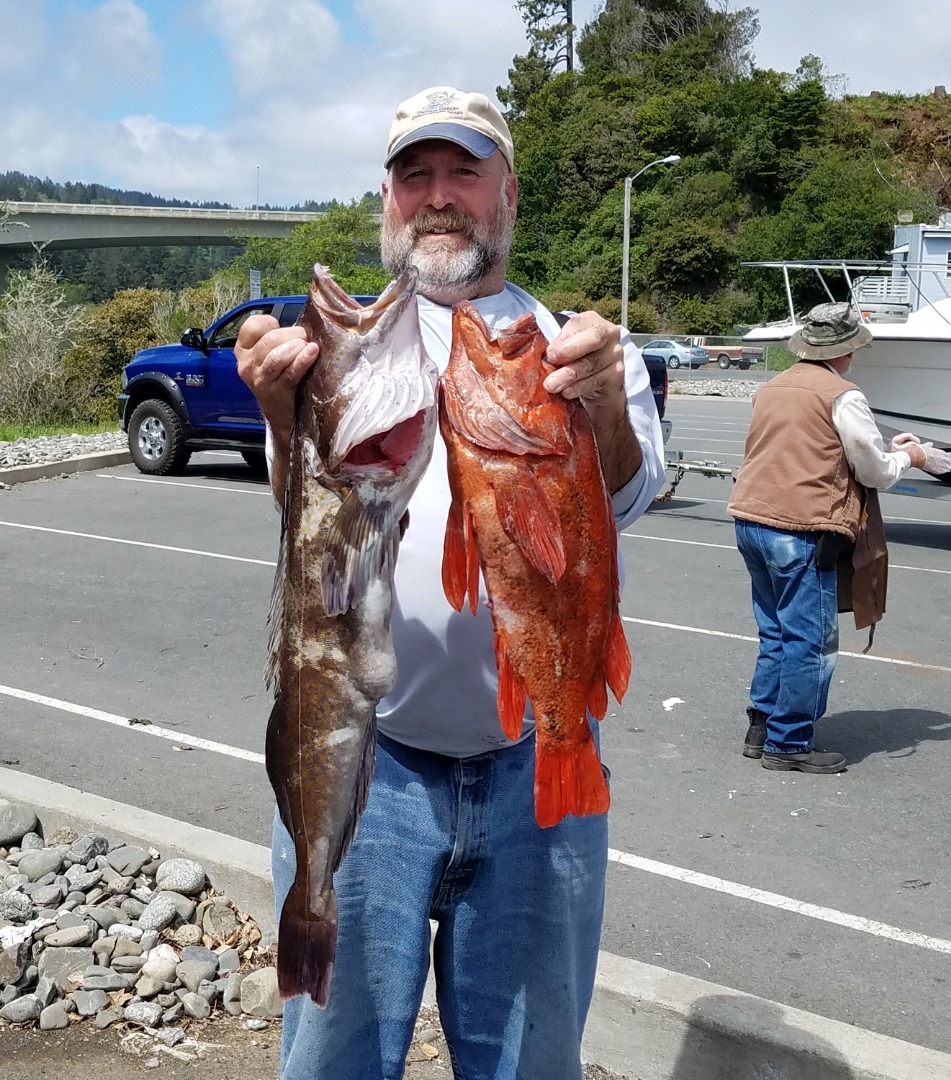From Sportfishing
Fish Report for 5-19-2018

Salmon Season Opens in the Oregon KMZ Today, May 19
5-19-2018
Larry Ellis
Fishing for salmon in the ocean, specifically in the Oregon KMZ will kick off today, May 19. The very liberal 100-day season lasting through August 26 can be likened to summer vacation. You know that the last day of school is coming, and that first day of the vacation seems like it will last forever.
Then, when the end of summer vacation is approaching, you say to yourself, "Where did all that time go?"
We will know the answer to that proverbial question in exactly 100 days.
Just for a refresher course, the Oregon KMZ is an expanse of ocean that spans from Humbug Mountain, just south of Port Orford, all the way to the Oregon/California border.
But most people fishing in the Oregon KMZ will be launching and landing out of the Port of Brookings Harbor.
The first thing that the recreational sport fisherman will be figuring out is where the fish are. For that answer, they often get reports from the commercial fleet, and sometimes it takes a few weeks to narrow into the fish zone.
But for all intents and purposes, there will be three areas in which the sport fishing community will be honing in.
But first things first. Do not venture south of the 42-degree line of latitude. That's California water and their KMZ season doesn't start until June 1. So make sure that your GPS is marking north of the 42-degree line.
So, the first thing that anglers will do is to head south toward the 42-degree line and fish between 5 and 7 miles off shore.
The second most popular area is straight offshore out of the Port of Brookings Harbor. When you are heading out between the Brookings jetties, you are heading due south. Anglers will be fishing where the fleet is concentrating, which could be anywhere from 3 to 8 miles offshore.
The third most popular go-to area is just uphill from the red can buoy, straddling anywhere between 90 and 140 feet of water, an area that has been dubbed, 'salmon alley'.
Look for trash lines, which are current lines that are slick on one side while being more ripply on the other side. Trash lines can travel for a half mile or more. Due to the nature of these current breaks, trash lines tend to gather broken pieces of kelp and other debris. If fishing on one side of the trash line doesn't produce, then switch to the other side of the current break.
Trash lines also tend to attract baitfish such as anchovies, herring and Pacific sand lance, and the baitfish tends to attract birds. Specifically, you will want to look for the common murres since these are baitfish-finding machines.
You will notice that sometimes flocks of murres will pick up and fly together, looking for baitfish. Take note of this activity and head where the murres are feeding.
Also, keep your eyes peeled for that perfect-looking greenish salmon water. This water has been easy to spot on the Terrafin Web Site. Look for the chlorophyll lines. A chlorophyll line has recently been spotted between 6 and 12 miles offshore, so a lot of fishermen will make the trolling loop along this line.
Most people will troll anchovies in the ocean in both the Oregon and California KMZ, since anchovies get bit a lot more than whole herring or cut-plug herring.
Anchovies are trolled faster than cut-plug baits. Anchovies are generally trolled between 1.7 to 2.2 knots), while cut-plug baits are trolled much slower, so it's not a good idea to troll both anchovies and herring on the same pass.
This is a barbless hook fishery, so make sure that you pinch off your barbs.
And when you do get a hookup, don't be afraid of letting the next guy know where it was caught and how deep your bait was running. Salmon are a nomadic tribe, so where you catch them one minute might not be the place where you catch them tomorrow.
Also, keep in mind, that should the ocean Chinook be enticed into the Chetco bay like they were last year, the river and its bay (or mouth) will not open up officially until May 22, which is less than one week away.
Rogue Springer Fishery Slows Down - Gold Beach
Fishing for lower Rogue River springers has slowed down a tad due to water temperatures rising and water flows dropping. But that will all change if we get a freshet.
"We have small runs of fresh springers that are moving up the river, but I am of the opinion that a lot of fish are staging off the mouth and they are waiting for a rain which would allow bank fishermen and boat fishermen to have success," said Jim Carey from the Rogue Outdoor Store in Gold Beach on Thursday.
"And I do believe that there are definitely fish waiting to go upriver, so the major run hasn't hit us yet."
Rockfish and Lingcod Fishing Outstanding
With numerous flat-calm seas with less than 5-knot winds, anglers have been limiting out on black rockfish, blue rockfish and some very large vermilion. Almost every day, I see anglers with at least one or two of the big goldfish in their fish boxes.
In addition, limits or near-limits of lingcod have been meeting the sharpened ends of a fillet knife with regularity. The prehistoric, mottled toothmeisters have been averaging between 10 and 14 pounds, sometimes even larger.
Most anglers have been catching their rockfish and lingcod on a variety of soft-plastic baits such as twin-tail Scampi imitations, Kalin Mogambos and 5-1/2 inch C.A.L. D.O.A. jerk baits.
If you have to carry one color, white would be the go-to color. That's great for the twin-tails and the single-tail lures. But, the killer C.A.L. D.O.A. jerk bait colors have been Nite Glow and Melon Back. Fish these red-hot lures on a long-shanked 2-ounce jig head.
Make sure that you are fishing on the bottom, as many of these fish have not been suspending enough to mark on most angler's fish finders. But, have faith enough to know that they are there.
Pacific Halibut Slow But Picking Up
Anglers have been heading uphill toward the Thomas Creek Bridge, fishing anywhere in the 170- to 190-feet depths for their flatties.
Although the action isn't hot and heavy in the Southern Oregon Sub-area, there have been verified reports of a 60-pounder, a 50-pounder and several 25- to 35-pound chickens.
Tight lines!
Larry Ellis, author, writer, columnist and photographer has had a 50-year passion for fishing in California and Oregon's saltwater and freshwater venues. He is a well-known writer for Oregon, Washington and California Fishing and Hunting News, Northwest Sportsman, California Sportsman and Pacific Coast Sportfishing. He currently writes monthly for Salmon Trout Steelheader Magazine, and is the author of two books, "Plug Fishing for Salmon" and "Buoy 10, the World's Largest Salmon Run." Both books can be bought from Amato Publications (amatobooks.com), Amazon and eBay. Ellis particularly loves living in his hometown of Brookings, Oregon - The heart of salmon country and gateway to fishing paradise.
< Previous Report Next Report >

Website Hosting and Design provided by TECK.net

